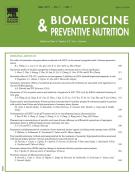Effect of diosgenin on cardiac tissue lipids, trace elements, molecular changes, TNF-? and IL-6 expression in CRF rats - 07/12/13

Abstract |
The aim of the present study was to evaluate the effect of diosgenin a proven antioxidant on chronic renal failure (CRF) induced abnormalities linked with oxidative stress in heart. CRF was induced in male Wistar rats by feeding the animals with 0.75% adenine-containing diet and diosgenin was given orally (everyday at the dose of 40mg/kg). Effect of diosgenin on cardiac tissue lipids, trace elements (iron, zinc, magnesium, copper and manganese) and activity of cardiac mitochondrial enzymes were assayed. Expression of tumor necrosis factor alpha (TNF-α) and interleukin-6 (IL-6) was also assessed. The Fourier transform infrared spectroscopy (FTIR) analysis was employed to indicate the oxidative stress related molecular changes in heart tissue. The outcomes of the study indicated that, diosgenin reduces the tissue lipid abnormalities induced by CRF. Cardiac elemental concentration was not changed in all groups but the plasma zinc was altered and diosgenin have no effect on it. Cardiac mitochondrial enzymes abnormalities and proinflammatory cytokines expression was also significantly reduced by diosgenin. Finally, the molecular and structural changes of proteins were also reduced by diosgenin treatment. The overall study shows that diosgenin with antioxidant function have enough potential to improve cardiac tissue abnormalities.
Le texte complet de cet article est disponible en PDF.Keywords : Diosgenin, Antioxidant, Oxidative stress, Chronic renal failure, Inflammatory cytokines, Trace elements
Plan
Vol 3 - N° 4
P. 389-392 - octobre 2013 Retour au numéroBienvenue sur EM-consulte, la référence des professionnels de santé.
L’accès au texte intégral de cet article nécessite un abonnement.
Déjà abonné à cette revue ?

